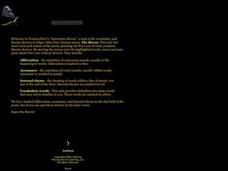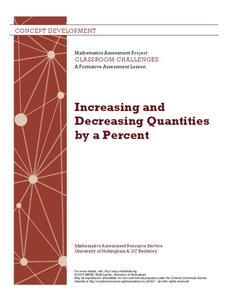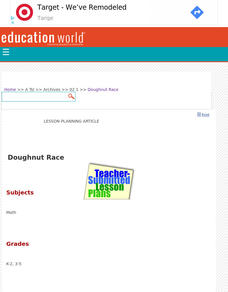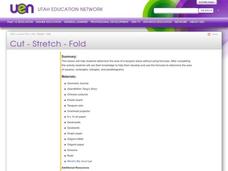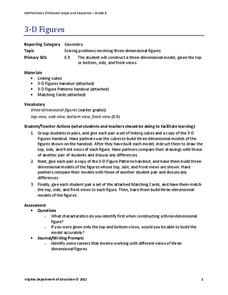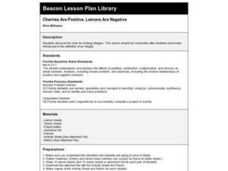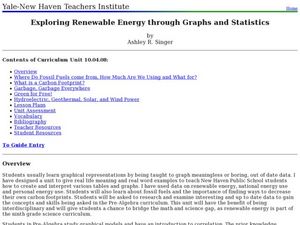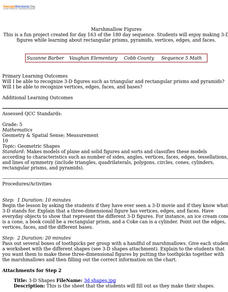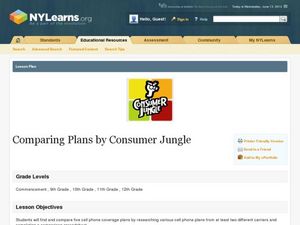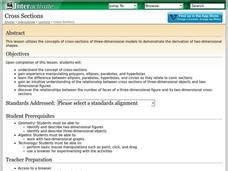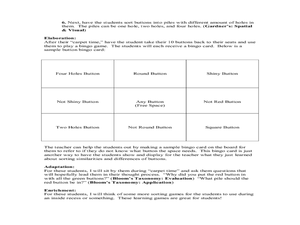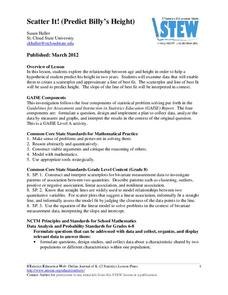Curated OER
Subtraction with Regrouping Lesson Plan
Learners explore regrouping while subtracting. In this subtraction lesson, pupils manipulate base 10 blocks to demonstrate regrouping. Multiple resources are provided.
Curated OER
Modeling: Having Kittens
Cats can't add, but they do multiply! Determine the number of descendants of a single cat given specific facts about cats and kittens. The lesson focuses on developing strategies for problem solving using both individual and group work....
Curated OER
Using Groups of Ten to Solve Problems
Upper graders solve math problems involving multiplication using specific strategies. They will use base-ten blocks, hundreds charts, and number lines to solve multiplication problems. Then they will practice several of the strategies...
Illustrative Mathematics
Comparing Freezing Points
Subtracting negative numbers can be confusing to your middle schoolers. Here, they are able to draw a number line and put their answer in sentence form to check their understanding of negative numbers.
Mathematics Assessment Project
Increasing and Decreasing Quantities by a Percent
As part of a study of percent and percent change, learners first complete an assessment task with several percent change problems. They then complete an activity using cards to create a diagram expressing percent increases and...
Curated OER
Doughnut Race
Pupils will practice math facts in this fast-paced and fun "Doughnut Race." This fun activity has learners practice their math facts in a face paced game environment. It can be adapted to all mathematical operations by using a poster...
Curated OER
Area of Tangram Pieces
Mathematicians calculate the area of a tangram piece without using formulas. They use a geometry journal to record activities during this instructional activity. They make a set of tangrams and use them to...
Virginia Department of Education
3-D Figures
Scholars construct three-dimensional figures to study dimension and side views. Learners build models using linking cubes to match views of different sides. After practicing with models, they attempt to match three-dimensional drawings...
Beacon Learning Center
Cherries Are Positive, Lemons Are Negative
Lemon heads and cherry drops combine for a sweet lesson on positive and negative integers. Following an activity sheet, they use lemon as negative and cherry as positive and follow directions with a partner. An assessment, a rubric, and...
Curated OER
Budget Bonanza
Students demonstrate how to use a budget plan. In this consumer math lesson, students calculate the total cost of data and determine if they are within budget. Students use calculators to determine the total cost. There is a rubric...
Curated OER
Exploring Renewable Energy Through Graphs and Statistics
Ninth graders identify different sources of renewable and nonrenewable energy. In this math instructional activity, learners calculate their own carbon footprint based on the carbon dioxide they create daily. They use statistics to...
EngageNY
Games of Chance and Expected Value 1
There's a strong chance that class members enjoy learning math through engaging games. Scholars analyze games of chance to determine long-term behavior. They learn to calculate expected value to help with this assessment.
Curated OER
Marshmallow Figures
Students enjoy making 3-D figures while learning about rectangular prisms, pyramids, vertices, edges, and faces. After a lecture/demo, students use marshmallows, toothpicks and a worksheet imbedded in this lesson plan to create 3...
Curated OER
Multiplication and Areas
Upper graders solve problems involving measurement of squares and rectangles to practice multiplication skills, finding area, and calculating prices and percentages. A performance assessment is included.
Curated OER
Graphing Linear Equations on the TI-73
Eighth graders work in pairs with a TI-73 graphing calculator to complete a multiple-choice review using the Classroom Performance System. Each team uses a remote unit to "click in" the answers. When all teams have completed the review,...
Curated OER
Boat Hull Design
Working in small groups students develop three alternative boat designs. They discuss the rationale for the type of hull, propeller, location of ballast, and type of building material used in their design. They build their boat.
Curated OER
Bubbles Galore
Students investigate bubbles. In this science lesson, students observe how long bubbles last and graph the results of the experiment.
Curated OER
Comparing Plans
Good consumer practices such as price comparison can make or break a budget. Youngsters research five different cell phone carriers and the plans they offer. They compile their data and determine which plan offers the best value. They...
Shodor Education Foundation
Cross Sections
Use this activity on cross-sections of three-dimensional shapes in your math class to work on algebra or geometry Common Core standards. The instructional activity includes a list of relevent terminology, and a step-by-step process to...
Association for Supervision and Curriculum Development (ASCD)
Interpreting Algebraic Expressions
The title of this instructional activity should be "Algebraic Expressions Four Ways." Not only will your class be translating verbal descriptions of algebraic expressions to symbols, but also working with their geometric interpretation...
EngageNY
Construct an Equilateral Triangle (part 2)
Triangles, triangles, and more triangles! In this second installment of a 36-part series, your young mathematicians explore two increasingly challenging constructions, requiring them to develop a way to construct three triangles that...
Curated OER
Grouping Buttons
Looking for a good lesson plan on counting and sorting? This lesson plan is worth a look! In this classification lesson plan, learners sort buttons by color, shape, shiny verses not shiny, or number of holes.
American Statistical Association
Scatter It! (Predict Billy’s Height)
How do doctors predict a child's future height? Scholars use one case study to determine the height of a child two years into the future. They graph the given data, determine the line of best fit, and use that to estimate the height in...
Mathematics Assessment Project
Representing Quadratic Functions Graphically
Sometimes being different is an advantage. An engaging activity has scholars match cards with quadratic functions in various forms. Along the way, they learn about how each form highlights key features of quadratic functions.



